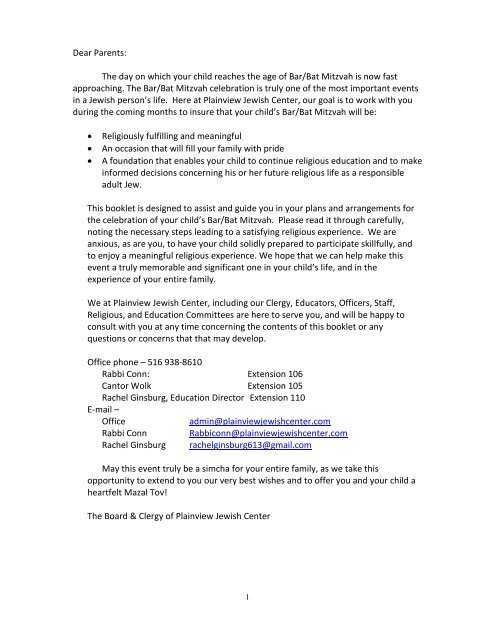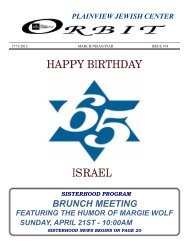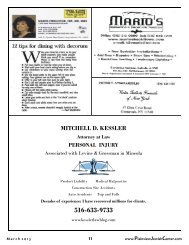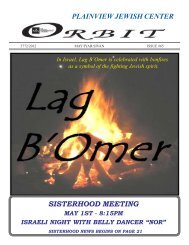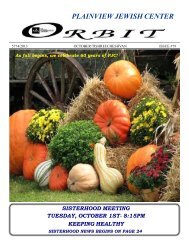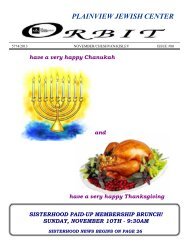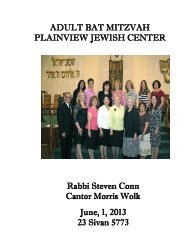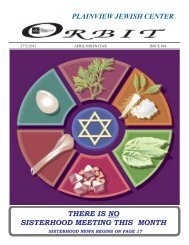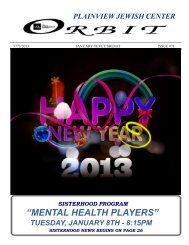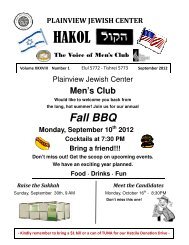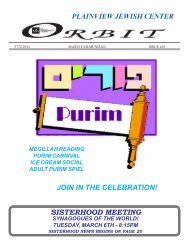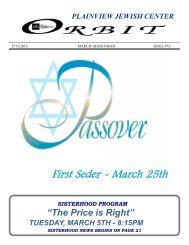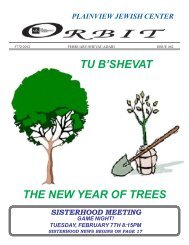THE ORIGIN OF BAR/BAT MITZVAH - Plainview Jewish Center
THE ORIGIN OF BAR/BAT MITZVAH - Plainview Jewish Center
THE ORIGIN OF BAR/BAT MITZVAH - Plainview Jewish Center
You also want an ePaper? Increase the reach of your titles
YUMPU automatically turns print PDFs into web optimized ePapers that Google loves.
Dear Parents:<br />
The day on which your child reaches the age of Bar/Bat Mitzvah is now fast<br />
approaching. The Bar/Bat Mitzvah celebration is truly one of the most important events<br />
in a <strong>Jewish</strong> person’s life. Here at <strong>Plainview</strong> <strong>Jewish</strong> <strong>Center</strong>, our goal is to work with you<br />
during the coming months to insure that your child’s Bar/Bat Mitzvah will be:<br />
<br />
<br />
<br />
Religiously fulfilling and meaningful<br />
An occasion that will fill your family with pride<br />
A foundation that enables your child to continue religious education and to make<br />
informed decisions concerning his or her future religious life as a responsible<br />
adult Jew.<br />
This booklet is designed to assist and guide you in your plans and arrangements for<br />
the celebration of your child’s Bar/Bat Mitzvah. Please read it through carefully,<br />
noting the necessary steps leading to a satisfying religious experience. We are<br />
anxious, as are you, to have your child solidly prepared to participate skillfully, and<br />
to enjoy a meaningful religious experience. We hope that we can help make this<br />
event a truly memorable and significant one in your child’s life, and in the<br />
experience of your entire family.<br />
We at <strong>Plainview</strong> <strong>Jewish</strong> <strong>Center</strong>, including our Clergy, Educators, Officers, Staff,<br />
Religious, and Education Committees are here to serve you, and will be happy to<br />
consult with you at any time concerning the contents of this booklet or any<br />
questions or concerns that that may develop.<br />
Office phone – 516 938-8610<br />
Rabbi Conn: Extension 106<br />
Cantor Wolk Extension 105<br />
Rachel Ginsburg, Education Director Extension 110<br />
E-mail –<br />
Office<br />
admin@plainviewjewishcenter.com<br />
Rabbi Conn Rabbiconn@plainviewjewishcenter.com<br />
Rachel Ginsburg rachelginsburg613@gmail.com<br />
May this event truly be a simcha for your entire family, as we take this<br />
opportunity to extend to you our very best wishes and to offer you and your child a<br />
heartfelt Mazal Tov!<br />
The Board & Clergy of <strong>Plainview</strong> <strong>Jewish</strong> <strong>Center</strong><br />
1
<strong>THE</strong> MEANING <strong>OF</strong> <strong>BAR</strong>/<strong>BAT</strong> <strong>MITZVAH</strong><br />
People often use the term “bar mitzvah” as a verb; as in “Joey was bar-mitzvah-ed at<br />
<strong>Plainview</strong> <strong>Jewish</strong> <strong>Center</strong>”. In <strong>Jewish</strong> tradition, however, “Bar Mitzvah” is a noun that<br />
refers to a <strong>Jewish</strong> male who is at least thirteen years old. At thirteen, <strong>Jewish</strong> tradition<br />
teaches that boys become “bar mitzvah”—capable of taking responsibility for carrying<br />
out all 613 commandments (mitzvot). In essence, then, at thirteen a boy becomes a<br />
<strong>Jewish</strong> adult, with all the attendant privileges and obligations The traditional age for<br />
“bat mitzvah”, the time when girls are considered <strong>Jewish</strong> adults, is twelve.<br />
It may seem strange to think of our early adolescent children as adults. In ancient times,<br />
however, boys at thirteen were apprenticed to a trade. Boys at thirteen and girls at<br />
twelve were often betrothed to each other in marriage. Childhood was much shorter<br />
two thousand years ago. The age of bar and bat mitzvah reflects these realities.<br />
Today, adulthood begins much later. But as the parent of any thirteen year old boy or<br />
twelve year old girl can attest, our bar and bat mitzvah age children are already<br />
experiencing big changes: physically and emotionally. The long transition from<br />
childhood to adulthood has begun. For our children, becoming bar or bat mitzvah is not<br />
so much a confirmation of their status as adults as it is a challenge. By challenging our<br />
children to live up to the responsibilities of a <strong>Jewish</strong> adult, we set out for them clear<br />
expectations for the role we want them to play in the <strong>Jewish</strong> community. We expect our<br />
children to grow into this role in their teenage years; so that what is possible but<br />
difficult for them at twelve or thirteen becomes comfortable and familiar at eighteen. In<br />
this sense, becoming bar or bat mitzvah is only the beginning of a child’s journey into<br />
<strong>Jewish</strong> adulthood.<br />
PREPARATIONS<br />
Preparation for Bar/Bat Mitzvah really begins at birth. Parents, family and our<br />
synagogue community together educate our children, model <strong>Jewish</strong> observance for<br />
them and inspire them to a love of God, Torah and the <strong>Jewish</strong> people.<br />
In addition, our students must fulfill formal educational requirements in order to<br />
celebrate Bar/Bat Mitzvah at <strong>Plainview</strong> <strong>Jewish</strong> <strong>Center</strong>.<br />
2
For Religious School Students:<br />
Each candidate will be required to maintain a satisfactory record of attendance,<br />
study and conduct in the regular Religious School class and Junior Congregation.<br />
Consistent attendance in both the Religious School and Junior Congregation will insure<br />
that your child will be adequately prepared at his/her Bar/Bat Mitzvah.<br />
Junior Congregation attendance requirements are:<br />
Every student in grades Bet and Gimel will be required to attend a<br />
minimum of 8 services throughout the year. 4 must be from Junior<br />
Congregation and 4 others may be at either Junior Congregation or<br />
other services excluding High Holiday services.<br />
Every student in grades Dalet and Hey will be required to attend a<br />
minimum of 12 services throughout the year excluding High Holiday<br />
services. At least 4 must be from Junior Congregation, 4 in the main<br />
sanctuary, and the remaining 4 can be at Junior Congregation or<br />
other services (e.g. Teen Minyan, Friday night services, and holiday<br />
services).<br />
In addition, every student in grades Dalet and Hey will be required to attend at least 6<br />
sessions of our Tallit and Tefillin program each year. Tallit and Tefillin meets on Sunday<br />
mornings during the first half of the school year. For boys, Tefillin must be obtained at<br />
the beginning of the Hey year. Girls are also encouraged to obtain and learn to put on<br />
Tefillin. Parents are strongly encouraged to attend these Tallit and Tefillin programs<br />
with their children.<br />
Please note that, parents are required to attend 6 Shabbat services and usher at 2 of<br />
these services in the year prior to a child’s Bar/Bat Mitzvah.<br />
We recognize that <strong>Plainview</strong> <strong>Jewish</strong> <strong>Center</strong> asks both our B’nai Mitzvah and their<br />
parents to make a significant commitment to participating in educational activities and<br />
services. We believe this commitment is a necessary component not only of Bar/Bat<br />
Mitzvah preparation, but also our children’s preparation for <strong>Jewish</strong> life. For this reason,<br />
we do reserve the right to modify a child’s and/or participation in our service should<br />
these requirements not be met.<br />
Day School Students<br />
Day School students are expected to meet the same Junior Congregation and service<br />
attendance requirements outlined for Religious School students above.<br />
3
Instruction – with Cantor Wolk<br />
Formal training for Bar/Bat Mitzvah begins one year prior to your child’s<br />
assigned date. Lessons are given on weekday afternoons and evenings throughout the<br />
year. Please be aware that students may not, as a rule, be excused from their Religious<br />
School classes to attend lessons.<br />
All students whose Bar/Bat Mitzvah is on a Shabbat morning are taught to recite<br />
the required blessings, the haftarah (prophetic reading corresponding to the weekly<br />
Torah portion), and the maftir (concluding section of the Torah portion). In addition,<br />
students are encouraged to learn and to conduct the portions of the service prior to<br />
taking out the Torah and returning it to the Ark.<br />
All students whose Bar/Bat Mitzvah is on a Shabbat afternoon, weekday Rosh<br />
Chodesh (new month), Chol Hamoed (intermediate day of a festival), or<br />
Monday/Thursday morning (American legal holiday) will be taught the appropriate<br />
Torah readings and are encouraged to learn to conduct major segments of the service.<br />
Your child will receive weekly assignments which he/she is expected to complete<br />
in advance of his/her meeting with the Cantor. Preparation for Bar/Bat Mitzvah cannot<br />
be successfully accomplished without a regimen of significant daily home practice, and,<br />
in this context, parental supervision is essential. The Cantor invites your interest in the<br />
training of your child, and is always available to answer any questions which may arise.<br />
A final rehearsal in the sanctuary for B’nai Mitzvah and their parents will be<br />
scheduled by the Cantor during the week before the Bar/Bat Mitzvah. This will enable<br />
you to observe your child on the bimah prior to the actual event and should enhance<br />
your appreciation of this milestone by acquainting you with the order and flow of the<br />
service.<br />
Instruction—With Rabbi Conn<br />
Two to four months prior to the ceremony, students will begin meeting with Rabbi Conn<br />
on a weekly basis to work on preparing a D’Var Torah (a presentation on the Torah<br />
portion of the week). Rabbi Conn has prepared a series of instructional units that will<br />
help introduce the student to the Torah portion, guide him/her in understanding the<br />
content of the Torah portion, and model how to derive meaningful lesson from Torah<br />
study. Typically, a student will be asked to complete five to six of these units before<br />
writing the actual D’var Torah.<br />
After the student completes these assignments, he/she will be given an outline of the<br />
structure of the D’var Torah. The student will then prepare the D’var Torah. Rabbi Conn<br />
will assist in editing and preparing subsequent drafts. In the week or weeks prior to the<br />
4
Bar/Bat Mitzvah, the student will practice delivering his/her D’var Torah from the bmah.<br />
Rabbi Conn will guide students during these sessions as well.<br />
Parents are an important part of the process of D’var preparation. Parents are asked to:<br />
a. Make sure students meet with Rabbi Conn on a weekly basis.<br />
b. Remind students to complete their weekly assignments.<br />
c. Provide guidance and assistance with all assignments, including the writing of<br />
the D’var Torah.<br />
d. Make sure the student has a separate folder for all work related to the D’var<br />
Torah.<br />
e. Encourage students to present a D’var Torah that reflects their own<br />
thoughts, words and feelings. Remember that the best presentations are the<br />
ones that are written by the students themselves, with appropriate guidance<br />
from the Rabbi and parents.<br />
A GUIDE TO <strong>THE</strong> <strong>BAR</strong>/<strong>BAT</strong> <strong>MITZVAH</strong> DAY:<br />
GENERAL INFORMATION AND PLAINVIEW JEWISH CENTER POLICIES<br />
1. A Shabbat Morning Bar/Bat Mitzvah<br />
a. Sabbath morning services begin promptly at 9:00 AM. The Bar/Bat Mitzvah<br />
and his/her immediate family should be seated in the front row at this time.<br />
b. Guests are urged to arrive on time.<br />
c. There will be no admission to the synagogue while the ark is open and during<br />
the Rabbi’s sermon.<br />
d. Worshippers are provided with a siddur (prayerbook) , a chumash (Torah<br />
translation and commentary), a tallit (prayershawl), and a kippah<br />
(headcovering).<br />
e. People who are called up to the Torah for a speaking aliyah will be provided<br />
with the Hebrew and the phonetic translation of the blessings.<br />
f. If non-<strong>Jewish</strong> friends or family attend, they will be asked to wear a kippah<br />
but not a tallit.<br />
g. If the family provides special kippot in honor of the Bar/Bat Mitzvah, no<br />
invitations should be on the basket. Only the name of the child is acceptable.<br />
h. Buses are not permitted in the parking lots.<br />
i. Shabbat morning services generally last until 12:00-12:30 PM. Please plan<br />
accordingly.<br />
2. Sanctity of the Sabbath<br />
On the Sabbath<br />
a. Smoking is prohibited in and around the synagogue.<br />
5
. Packages, gifts, food or liquor may not be brought to or removed from the<br />
synagogue.<br />
c. Cell phones, cameras, hand held gaming devices, and other electronics, may<br />
not be used on synagogue property—before, during or after the service.<br />
Please turn off all cell phones before entering the sanctuary.<br />
d. Instrumental music is not permitted.<br />
e. All worshippers should be properly and tastefully dressed (the PJC dress code<br />
is included in this handbook).<br />
3. Decorum<br />
Be sure to avoid engaging in conversation during services. Please remember that, as in<br />
any other public place, children must be supervised at all times.<br />
4. Friday Evening Service and Oneg Shabbat<br />
As part of the Bar/Bat Mitzvah celebration, the Bar/Bat Mitzvah will chant the kiddush<br />
at the Friday evening services. The Friday evening Oneg Shabbat will be hosted by the<br />
parent(s) in honor of the simcha.<br />
5. Shabbat Morning Kiddush<br />
The parents of all Bar/Bat Mitzvah children will sponsor the Shabbat morning basic<br />
kiddush which is included in the Bar/Bat Mitzvah fee. Should a family expect more than<br />
60 guests, please contact the kiddush chairperson to make arrangements for additional<br />
refreshments. If you are interested in an extended Kiddush, please contact the office<br />
for further information.<br />
If you are interested in a more elaborate professionally catered kiddush, please contact<br />
our caterer, Irwin Richman Caterers at (516) 938-1310. A separate catering room will be<br />
set aside for your guests. Please note that unless you choose to invite the entire<br />
congregation to the catered kiddush, a basic kiddush for the congregation is still<br />
necessary. The basic kiddush is usually held in the Kirschner Room. However, there are<br />
Sabbaths when that space is utilized by the caterer or for congregational programs, in<br />
which case, the kiddush will be held in the main lobby or the youth corner.<br />
In addition, wine and liquor for the kiddush are to be provided by the B’nai/B’not<br />
Mitzvah families. The minimum liquor requirement is 2 bottles of Scotch and 1 bottle of<br />
kosher wine per family. These should be brought to the synagogue office either<br />
Thursday or Friday afternoon before 3:00 PM.<br />
Decorative kippot baskets with personalized kippot and/or head coverings, if so desired,<br />
and candy baskets also must be brought to the synagogue by Friday 3:00 PM. It is the<br />
policy of the synagogue that if your catered affair is not with our caterer, only the child’s<br />
name may be displayed on the basket(s).<br />
6
According to synagogue regulations, no food may be brought into the synagogue by<br />
anyone. This includes the candy which some families toss at the Bar/Bat Mitzvah. If you<br />
wish to follow this custom, arrangements can be made through the office to order a<br />
small amount of lightweight kosher candy provided by our United Synagogue Youth at<br />
the cost of $36.00. You will have to provide a decorative basket for the candy if you so<br />
desire. Candy should be distributed to adults in the first few rows of the sanctuary for<br />
gentle tossing. There is no religious requirement associated with this practice. It is<br />
purely optional.<br />
6. Shabbat Mincha Maariv Bar/Bat Mitzvah<br />
a. Services begin promptly 15 minutes before sundown. The parents and their<br />
Bar/Bat Mitzvah child are to arrive 15 minutes before the services<br />
commence. Based upon our experience, may we suggest that the Sabbath<br />
Mincha Maariv Bar/Bat Mitzvah time be reported to your guests one-half<br />
hour before the actual start of the service.<br />
b. It is the policy of the <strong>Plainview</strong> <strong>Jewish</strong> <strong>Center</strong> that if a family desires to have<br />
its Bar/Bat Mitzvah at mincha time, they must use our caterer, Irwin Richman<br />
Caterers. Proper scheduling procedures, as previously outlined, must be<br />
adhered to.<br />
7. Photography and Videography<br />
Since photography and videography are not allowed on Shabbat, arrangements must be<br />
made in advance with the Rabbi and/or the Cantor, except on Fridays, to have<br />
photographs and/or video in the sanctuary prior to the Bar/Bat Mitzvah.<br />
8. Bar/Bat Mitzvah Fees<br />
According to the policy of PJC, the current fee for a Bar/Bat Mitzvah and all financial<br />
obligations to the synagogue must be fully paid 6 months prior to the Bar/Bat Mitzvah.<br />
If these obligations are not met, cessation of Bar/Bat Mitzvah preparation may result.<br />
9. Catered Affairs<br />
Any catered affair at the synagogue must be booked with our approved caterer, Irwin<br />
Richman. Our contract with the caterer provides that he may use our facilities for affairs<br />
for non-members. Members, however, have a priority in booking at the synagogue.<br />
7
TORAH HONORS (ALIYOT)<br />
The honor of being called to the Torah is called an aliyah. Bar/Bat Mitzvah<br />
families are given the opportunity to designate four individuals or couples called for<br />
aliyot on the day of the Bar/Bat Mitzvah (in addition to the Bar/Bat Mitzvah, who is<br />
called for the maftir/final aliyah). Usually the parents are called for the aliyah preceding<br />
the Bar/ Bat Mitzvah. That means that, in practice, the Bar/Bat Mitzvah family will<br />
designate three individuals (or married couples) to be called for an aliyah.<br />
Most often, the fourth through seventh aliyot are reserved for the Bar/Bat<br />
Mitzvah family’s designees. Please note, though, that It is customary to call a Cohen for<br />
the first aliyah, a Levite for the second and an Israelite for the third and succeeding<br />
aliyot. If you are planning to honor a Kohen or Levi with an aliyah, please consult with<br />
Rabbi Conn as to the proper procedure.<br />
There are several other honors available to Bar/Bat Mitzvah families. Families<br />
may designate someone to dress the Torah (Gelilah), someone to carry the Torah when<br />
it is returned to the ark, and up to 4 people to open and close the Ark when the Torah is<br />
returned to the Ark. For those families that include a non-<strong>Jewish</strong> parent or grandparent,<br />
please see Rabbi Conn for appropriate ways to honor these family members during the<br />
service.<br />
The Bar/Bat Mitzvah Honors form to help you in designating your honorees is<br />
included within this packet. You must return a copy of this form to the Rabbi at least<br />
two (2) weeks prior to the date of the ceremony. Please fill in the full English name of<br />
each person you are honoring, the full Hebrew name (for example first name ben/bat<br />
parents’ first names), and the relationship to the Bar/Bat Mitzvah. The chart is also<br />
available for download at the plainviewjewishcenter.com.<br />
Please note that the congregation reserves the right to designate aliyot for<br />
others who may be celebrating a family simcha (i.e. a baby naming, aufruf) on the day of<br />
the Bar/Bat Mitzvah celebration. The number of honors given to the Bar/Bat Mitzvah<br />
family will not be affected.<br />
We suggest that you mail a copy of the Torah blessings to each of your honorees to<br />
prepare for his/her aliyah in advance. A sheet that includes the Torah blessings in<br />
Hebrew and transliterations, as well as instructions on how to take an aliyah can be<br />
found in this booklet Each Bar/Bat Mitzvah student receives a tape recording of the<br />
blessings from the Cantor. An audio file of the Torah blessings can be found on the<br />
<strong>Plainview</strong> <strong>Jewish</strong> <strong>Center</strong> website.<br />
Please make sure that your aliyah honorees arrive at the synagogue in time to accept<br />
their honors.<br />
8
<strong>MITZVAH</strong> PROJECTS:<br />
Shimon Hatzadik was one of the remnants of the Great Assembly. He<br />
taught: ‘The world stands on account of three things: Torah, Avodah<br />
(Divine Worship) and Gemilut Chasadim (Acts of Kindness).’<br />
Mishnah Pirkei Avot (The Teachings of Our Sages) 1:2<br />
The passage above teaches us that there are really three fundamental areas of<br />
activity in <strong>Jewish</strong> life: worship, the study of Torah and acts of kindness. To be a wellrounded<br />
<strong>Jewish</strong> adult, we should be engaged in all three of these areas. Our BarBat<br />
Mitzvah program provides an opportunity for each of our B’nai Mitzvah not only to<br />
participate in Torah study, worship and acts of kindness, but to provide leadership for<br />
the congregation and community.<br />
In their studies with Cantor Wolk, our B’nai Mitzvah learn to lead the<br />
congregation in prayer and serve as the congregation’s representative reading from the<br />
Torah and haftorah. In their studies with Rabbi Conn, our students learn not only how to<br />
study Torah and derive lessons that apply to everyday life; but also to be teachers who<br />
can share their insights with the congregation. By selecting and completing a Mitzvah<br />
project, our B’nai Mitzvah not only engage in acts of kindness, but provide others the<br />
opportunity to join them.<br />
Students celebrating Bar/Bat Mitzvah in 2010 are encouraged to select a Mitzvah<br />
project at least six months prior to BarBat Mitzvah. Students must fill out a Mitzvah<br />
project form and get the approval of the Rabbi before beginning. During the meetings<br />
with the Rabbi devoted to D’var Torah preparation, each student will be asked to share<br />
his or her progress on the Mitzvah project with the Rabbi. Those who complete the<br />
project will be recognized for their achievement during the Bar/Bat Mitzvah celebration.<br />
Our congregation will be happy to help publicize all mitzvah projects to our Religious<br />
School and Congregational members through the <strong>Plainview</strong> <strong>Jewish</strong> <strong>Center</strong> Website.<br />
Students should choose a project carefully. Rabbi Danny Siegel, a pioneer in<br />
creating opportunities for young people to be involved in mitzvah projects suggests the<br />
following:<br />
Start by asking yourself a few questions.<br />
We all know the traditional four questions recited at the Passover seder--<br />
Ma nishtana haleila hazeh…. But here is a different set of four questions, as well<br />
as a Question We Need to Ask Before We Ask the Four Questions.<br />
First, we must ask: What are the other person's (the person we want to<br />
help) needs?<br />
Then, and only then, should we ask the Four Questions:<br />
1. What am I good at?<br />
2. What do I like to do?<br />
3. What bothers me so much about what is wrong in the world that I get<br />
very angry and want to do whatever I can to change it?<br />
4. Whom do I know?<br />
9
And finally: Why not?<br />
#1 may include: giving big hugs, playing soccer, baking chocolate chip<br />
cookies, talking on the phone for hours, being a computer whiz, or drawing or<br />
painting the most beautiful pictures.<br />
#2 In order to answer what you like to do, you will have to think a little bit<br />
more. What activities give you the most pleasure? Can you sit and read for hours?<br />
Are you really excited about playing the guitar or keyboard?<br />
#3 "What bothers you?" Are you tired of hearing that there are untold<br />
numbers of kids who go to bed hungry every night? Are you enraged when you<br />
think about what terrible things happened when the World Trade <strong>Center</strong> was<br />
attacked? Do you feel uncomfortable when you visit a nursing home and see so<br />
many people just sitting and staring into space? Now, turn what bothers you into<br />
tikkun olam and make a difference.<br />
#4 The classic example of "Whom do I know?": After the World Trade<br />
<strong>Center</strong> attack on September 11, 2001, we saw unprecedented giving and helping<br />
from all parts of the country. Some people raised money by making American<br />
flag pins with safety pins and beads, others held bake sales--anything to raise<br />
funds to help the victims.<br />
The late George Harrison of Beatles fame went one step further. He<br />
remembered how his own father, a firefighter in his native England, put his life on<br />
the line every time he went out to fight a fire and then used the "Whom Do I<br />
Know" principle to raise tens of millions of dollars for relief for fallen<br />
firefighters. How did he do it? He called all of his friends, the most famous rock<br />
stars we know, and brought them together for an incredible concert. The result?<br />
Millions of dollars for relief for the victims of the terror attacks.<br />
Know someone who enjoys playing a musical instrument as much as you<br />
do and would like to join you in a concert at a local nursing home? Or maybe you<br />
have a relative who is a dentist and is willing to give you dental supplies that can<br />
be donated to a dental clinic in Jerusalem? Are you and your friends ace soccer<br />
players who could teach kids at a homeless shelter how to play?<br />
There is no end to the answers to this question. You just need to think<br />
about it… and do it!<br />
The additional question--"Why Not?"--is generally the easiest of all.<br />
Almost always the answer is, "There's no real reason why not. So, let's do it."<br />
Now, list your own answers, pick a piece of tikkun olam, and go do it.<br />
10
Here are some examples of Mitzvah project opportunities available in our area.<br />
Mid Island Y/JCC<br />
Opportunities for hands on mitzvah projects are available through the Senior Adult<br />
program and the K.I. S. S. (children with special needs) program. In addition, the Teen<br />
Department sponsors group projects that can be used to fulfill all or part of this<br />
requirement.<br />
Contact Assistant Executive Director Sue Tregerman at (516) 822-3535 ext. 320 to<br />
coordinate your project.<br />
Locks for Love:<br />
http://www.locksoflove.org/<br />
Locks of Love is a public non-profit organization that provides hairpieces to financially<br />
disadvantaged children in the United States and Canada under age 21 suffering from<br />
long-term medical hair loss from any diagnosis. We meet a unique need for children by<br />
using donated hair to create the highest quality hair prosthetics. Most of the children<br />
helped by Locks of Love have lost their hair due to a medical condition called alopecia<br />
areata, which has no known cause or cure. The prostheses we provide help to restore<br />
their self-esteem and their confidence, enabling them to face the world and their peers.<br />
<strong>Jewish</strong> National Fund:<br />
http://support.jnf.org/site/DocServer/JNFandU3_28_07.pdf?docID=1341<br />
Over the past 107 years, JNF has evolved into a global environmental leader by planting<br />
240 million trees, building over 200 reservoirs and dams, developing over 250,000 acres<br />
of land, creating more than 1,000 parks, providing the infrastructure for over 1,000<br />
communities, bringing life to the Negev Desert and educating students around the world<br />
about Israel and the environment.<br />
The link above leads to a page that lists a number of wonderful Mitzvah project ideas in<br />
connection with Israel and the environment.<br />
MAZON<br />
http://mazon.org/wp-content/uploads/2009/10/Bar-Bat-Mitzvah-Program-Final.pdf<br />
Founded in 1985, MAZON: A <strong>Jewish</strong> Response to Hunger is a national nonprofit<br />
organization that allocates donations from the <strong>Jewish</strong> community to prevent and<br />
alleviate hunger among people of all faiths and backgrounds.<br />
Each year, MAZON grants over $4 million to more than 300 carefully screened hungerrelief<br />
agencies, including emergency food providers, food banks, multi-service<br />
11
organizations and advocacy groups that seek long-term solutions to the hunger<br />
problem.<br />
MAZON provides the outline for a mitzvah project that involves learning about and<br />
raising money to combat hunger. Complete the Mitzvah project at the link shown<br />
above.<br />
A Package From Home<br />
http://www.apackagefromhome.org/<br />
A project that connects B’nai Mitzvah with Israeli soldiers. The project involves sending letters<br />
and packages to Israeli soldiers who have no family in Israel.<br />
These are only a few of the many projects that B’nai Mitzvah can undertake. See Rabbi Conn<br />
or Mrs. Ginsburg for additional ideas.<br />
SUGGESTED READING FOR PARENTS AND B’NAI <strong>MITZVAH</strong><br />
The following is a short list of reading material of benefit to both student and parent.<br />
i. Bar Mitzvah sections of <strong>Jewish</strong> Catalogs, particularly The Second <strong>Jewish</strong> Catalog, p. 61-67.<br />
ii. Rabbi Jeffrey K. Salkin, Putting God on the Guest List, <strong>Jewish</strong> Lights Publishing, Woodstock,<br />
Vermont, c1993.<br />
iii. Seymour Rossel (and an Editorial Committee of Many!), A Spiritual Journey, Bar Mitzvah and<br />
Bat Mitzvah Handbook, Behrman House, Inc., W. Orange, NJ, c 1993.<br />
iv. The Complete Artscroll Siddur<br />
v. Rabbi Reuven Hammerman, Or Hadash: A Commentary on Siddur Sim Shalom for Shabbat and<br />
Festivals<br />
PEOPLE WHO CAN HELP<br />
Rabbi Steven Conn………………………………………….. 938-8610 X106<br />
Cantor Morris Wolk…………………………………………. 938-8610 X105<br />
Susan Goldman, Temple Manager……………………. 938-8610 X 101<br />
Zelda King, Synagogue Secretary………………………. 938-8610 X103<br />
Irwin Richman, Caterers……………………………….……938-1310<br />
Please contact the synagogue secretary for the names and phone numbers if you are<br />
interested in:<br />
Sisterhood Judaica Shop (for kippot and other items)<br />
Sisterhood Book of Life<br />
Kiddush Chairperson<br />
USY Director (for candy)<br />
Tree of Life Plaques<br />
Or any other services<br />
12
PJC DRESS CODE<br />
For your guidance, we are including in this handbook, the PJC Dress Code designed by<br />
our Ritual Committee and approved by our Board of Trustees. These guidelines apply<br />
to services in the main sanctuary.<br />
REQUIRED<br />
MEN AND BOYS<br />
. Men and boys must wear a head covering upon entering the<br />
building and may not remove it during the entire time they<br />
are in the building.<br />
. Men and boys must wear shirts with sleeves and long trousers<br />
in the sanctuary.<br />
. Men must wear a tallit on the bimah at those services that<br />
require it.<br />
WOMEN AND GIRLS<br />
. Women and girls over the age of 12 must wear head coverings<br />
and have their shoulders covered on the bimah.<br />
. Women and girls must be dressed with appropriate modesty.<br />
SUGGESTED<br />
MEN AND BOYS<br />
. Men should wear jackets on the bimah.<br />
. <strong>Jewish</strong> men should wear a tallit at those services that require it.<br />
WOMEN AND GIRLS<br />
. Women and girls should wear dresses, skirts or dress slacks.<br />
. Women and girls should not wear short skirts, low-cut dresses,<br />
bare shoulders or bare midriffs.<br />
. Women are encouraged to have head coverings during services.<br />
. Women are encouraged to wear a tallit.<br />
. Shawls should be used to cover bare shoulders.<br />
January 2010<br />
M A Z A L T O V<br />
13
<strong>BAR</strong> <strong>MITZVAH</strong> HONORS<br />
*Families can take 4 aliyot<br />
*Dress the Torah Scroll (1-2)<br />
*Ark Opening (1-2)<br />
* Torah Carrier (1)<br />
Honor English Name Hebrew Name<br />
Ark Opening #1<br />
_____ ben/bat _____ v’<br />
___<br />
1. First (Kohen) Aliya<br />
2. Second (Levi) Aliya<br />
3. Shelishi<br />
4. *Re’vi’i `<br />
5. *Chamishi<br />
6. *Shishi<br />
7. *Shevi’i<br />
*Maftir:<br />
(The Bar/Bat Mitzvah)<br />
14
Honor English Name Hebrew Name<br />
Hagbah (lifting the Torah)<br />
_____ ben/bat _____ v’<br />
___<br />
*Gelilah (1-2) (dressing the<br />
Torah)<br />
*Ark Opening #2 (1-2)<br />
*Torah Carrier (1)<br />
15
Mitzvah Project Form<br />
Please return this form to Rabbi Conn no later than 6 months prior to your<br />
Bar/Bat Mitzvah date. Discuss your project with the Rabbi Conn prior to<br />
completing this form.<br />
Name of Bar/Bat Mitzvah:_____________________________<br />
Project will benefit:___________________________________________<br />
__________________________________________________________<br />
Please write a brief description of the project that you plan:<br />
Timeline to accomplish this project: ________________________________<br />
Goal:_________________________________________________________<br />
<strong>Jewish</strong> values reflected in this project:_______________________________<br />
_____________________________________________________________<br />
________________________<br />
Signature of Bar/Bat Mitzvah<br />
___________________<br />
Parent Signature<br />
16
READINGS FOR <strong>THE</strong> TALIT PRESENTATION<br />
Families may choose to present the Bar/Bat Mitzvah with a talit at the beginning of the Shabbat<br />
morning service. Parents and/or grandparents will be called to the bimah with the Bar/Bat Mitzvah.<br />
Families may choose one of the following prayers to recite during the presentation.<br />
I.<br />
(For a girl)<br />
On this Shabbat, when our daughter celebrates becoming a Bat Mitzvah, we have come with her and our<br />
loved ones to join in worship and to offer our prayer of thanksgiving.<br />
We thank You, God, for the privilege of sharing with You in the miracle of creation that brought our<br />
daughter into this world. We are grateful for the thirteen years of nurturing this life, for the unnumbered<br />
joys and challenges that these years have brought us. Praise to You, Adonai, for watching over us and<br />
guiding us, and allowing us to share this simcha today.<br />
(The Bat Mitzvah recites the Talit Blessing)<br />
(Presenters drape the talit over the shoulders of the Bat Mitzvah)<br />
As we place this Talit upon our daughter’s shoulders, we pray: Watch over her God, on this special day and<br />
every day. Grant her a growing understanding of the true significance of this occasion and a deepening<br />
loyalty to everything it represents. May the teachings of our heritage guide her throughout life, and may she<br />
lead a life worthy of Your blessings.<br />
(For a boy)<br />
On this Shabbat, when our son celebrates becoming a Bar Mitzvah, we have come with him and our loved<br />
ones to join in worship and to offer our prayer of thanksgiving.<br />
We thank You, God, for the privilege of sharing with You in the miracle of creation that brought our son<br />
into this world. We are grateful for the thirteen years of nurturing this life, for the unnumbered joys and<br />
challenges that these years have brought us. Praise to You, Adonai, for watching over us and guiding us,<br />
and allowing us to share this simcha today.<br />
(The Bar Mitzvah recites the Talit Blessing)<br />
(Presenters drape the talit over the shoulders of the Bar Mitzvah)<br />
As we place this Talit upon our son’s shoulders, we pray: Watch over him God, on this special day and<br />
every day. Grant him a growing understanding of the true significance of this occasion and a deepening<br />
loyalty to everything it represents. May the teachings of our heritage guide him throughout life, and may he<br />
lead a life worthy of Your blessings.<br />
II.<br />
(For a girl)<br />
We thank You, O God, for the joyous fulfillment we feel as our daughter reaches the threshold of<br />
womanhood. How privileged we feel that she is our daughter, and she is bound to us by bonds of love, of<br />
memory and of hope.<br />
O God, accept our thankfulness for the thirteen years that have come and gone, bless our hope for the years<br />
that are yet to be. May Your mercy and guidance accompany this Bat Mitzvah at all times, in alife marked<br />
by reverence for Torah and love of all Your children.<br />
(The Bat Mitzvah recites the Talit Blessing)<br />
(Presenters drape the talit over the shoulders of the Bat Mitzvah)<br />
17
As we place this Talit upon our daughter’s shoulders, we pray: Watch over her God, on this special day and<br />
every day. Grant her a growing understanding of the true significance of this occasion and a deepening<br />
loyalty to everything it represents. May the teachings of our heritage guide her throughout life, and may she<br />
lead a life worthy of Your blessings.<br />
(For a boy)<br />
We thank You, O God, for the joyous fulfillment we feel as our son reaches the threshold of manhood.<br />
How privileged we feel that he is our son, and he is bound to us by bonds of love, of memory and of hope.<br />
O God, accept our thankfulness for the thirteen years that have come and gone, bless our hope for the years<br />
that are yet to be. May Your mercy and guidance accompany this Bar Mitzvah at all times, in a life marked<br />
by reverence for Torah and love of all Your children.<br />
(The Bar Mitzvah recites the Talit Blessing)<br />
(Presenters drape the talit over the shoulders of the Bar Mitzvah)<br />
As we place this Talit upon our son’s shoulders, we pray: Watch over him God, on this special day and<br />
every day. Grant him a growing understanding of the true significance of this occasion and a deepening<br />
loyalty to everything it represents. May the teachings of our heritage guide him throughout life, and may he<br />
lead a life worthy of Your blessings.<br />
(For a girl)<br />
Our dear (or name of the Bat Mitzvah)<br />
May you live to see your world fulfilled;<br />
May your destiny be for worlds still to come.<br />
May you trust in generations past and yet to be;<br />
May your heart be filled with intuition and your words with insight.<br />
May songs of praise ever be on your tongue;<br />
And your vision be on a straight path before you.<br />
May your eyes shine with the light of holy words,<br />
And your face reflect the brightness of the heavens.<br />
May your lips ever speak wisdom and your fulfillment be in righteousness.<br />
Even as you yearn to hear the words of the Holy Ancient One of Old.<br />
(The Bat Mitzvah recites the Talit Blessing)<br />
(Presenters drape the talit over the shoulders of the Bat Mitzvah)<br />
III.<br />
As we place this Talit upon our daughter’s shoulders, we pray that your protecting and loving care will<br />
accompany her wherever she goes and in all that she does. Help her to become al that she is capable of<br />
being. Give her strength and courage as she grows as a Jew. May she know the joy of continuing to study<br />
Torah, fulfill mitzvoth and join with the congregation in prayer. May the teachings of our heritage guide<br />
her throughout life, and may she lead a life worthy of Your blessings.<br />
18
(For a boy)<br />
Our dear (or name of the Bat Mitzvah)<br />
May you live to see your world fulfilled;<br />
May your destiny be for worlds still to come.<br />
May you trust in generations past and yet to be;<br />
May your heart be filled with intuition and your words with insight.<br />
May songs of praise ever be on your tongue;<br />
And your vision be on a straight path before you.<br />
May your eyes shine with the light of holy words,<br />
And your face reflect the brightness of the heavens.<br />
May your lips ever speak wisdom and your fulfillment be in righteousness.<br />
Even as you yearn to hear the words of the Holy Ancient One of Old.<br />
(The Bar Mitzvah recites the Talit Blessing)<br />
(Presenters drape the talit over the shoulders of the Bar Mitzvah)<br />
As we place this Talit upon our son’s shoulders, we pray that your protecting and loving care will<br />
accompany her wherever he goes and in all that he does. Help him to become al that he is capable of being.<br />
Give him strength and courage as he grows as a Jew. May he know the joy of continuing to study Torah,<br />
fulfill mitzvoth and join with the congregation in prayer. May the teachings of our heritage guide him<br />
throughout life, and may he lead a life worthy of Your blessings.<br />
For a boy or a girl)<br />
IV.<br />
(B’nai Mitzvah’s name), as we place this talit on your shoulders, wrap yourself in the dreams of Israel and<br />
all the generations of our people who have come up to the bimah to lead the congregation in prayer.<br />
Clothe yourself with this mantle of prayer and listen to the heartbeat of centuries.<br />
Carry with you the psalms of David, the songs of Solomon and the dance of Miriam.<br />
Hear the prophets calling out the words which reshape reality.<br />
All this, and the future, too, is in this tallit…which we now present to you with love…Mazel Tov!<br />
(Bar/Bat Mitzvah now takes the Tallit and recites blessing)<br />
(Following the Blessing the Bar or Bat Mitzvah recites the following)<br />
As I wear this tallit for the first time today, I realize that on my shoulders, I now carry my responsibility to<br />
continue the traditions of Am Yisrael, the People of Israel. These fringes, with their special knots on each<br />
corner, serve as a visible reminder of the mitzvot, the commandments of the Torah. As I wrap myself in my<br />
tallit, I am accepting the obligation to fulfill these mitzvot as it is written in the Torah.<br />
(Parents hug Bar/Bat Mitzvah and return to their seats)<br />
19
PARENTS’ BLESSINGS FOR <strong>BAR</strong>/<strong>BAT</strong> <strong>MITZVAH</strong><br />
1. The Parents recite the She-he-chi-anu prayer together in Hebrew and<br />
English; expressing gratitude to God for reaching this joyous occasion.<br />
<br />
<br />
Baruch Ata Adonai, Elo-hay-noo Melech Ha-Olam, She-he-che-yannoo,<br />
V’kee-manoo, V’Hee-gee-anoo, Lazman Hazeh.<br />
Praised are You, Lord our God, who rules the universe, for granting us life,<br />
for sustaining us, and for bringing us to this day.<br />
The Parents bless their children with the traditional blessing for sons or<br />
daughters in Hebrew and English: It is traditional for the parents to place<br />
their hands on their child’s head during the blessing.<br />
For a boy:<br />
<br />
Y’seem-cha eh-lo-heem k’ef-ra-yeem v’chee-m’na-she.<br />
May God grant you the blessings of Ephraim and Menasheh.<br />
For a girl:<br />
<br />
Y'seem-aych eh-lo-heem k’sara, reev-ka, ra-chayl v’lay-ah.<br />
May God grant you the blessings of Sarah, Rebecca, Rachel and Leah.<br />
3. The Cantor continues the blessing in Hebrew. The Parents respond in<br />
English.<br />
<br />
May the Lord bless you and guard you<br />
<br />
May the Lord show you favor and be gracious to you<br />
<br />
May the Lord show you kindness and grant you peace.<br />
20
AN ALIYAH TO <strong>THE</strong> TORAH<br />
Blessing before the reading of the Torah<br />
Begin with<br />
<br />
Bor-chu et Ado-nai ha-me-vo-rach<br />
The Congregation will answer<br />
<br />
Ba-ruch Ado-nai ha-me-vo-rach le-olam va-ed<br />
You repeat<br />
<br />
Ba-ruch Ado-nai ha-me-vo-rach le-olam va-ed<br />
Then continue<br />
<br />
<br />
<br />
Ba-ruch a-tah Ado-nai, Elo-hay-nu Me-lech Ha-o-lam, a-sher<br />
ba-char ba-nu mee-kol ha-a-meem v’na-tan la-nu et Torahto,<br />
Ba-ruch a-tah Ado-nai, no-tayn ha-Torah<br />
After the Torah is read, recite the following:<br />
<br />
<br />
<br />
Ba-ruch a-tah Ado-nai, Elo-hay-nu Me-lech Ha-o-lam, a-sher<br />
na-tan la-nu To-rat em-et, v’cha-yay o-lam na-ta b’to-chaynu,<br />
Ba-ruch a-tah Ado-nai, no-tayn ha-Torah.<br />
21


